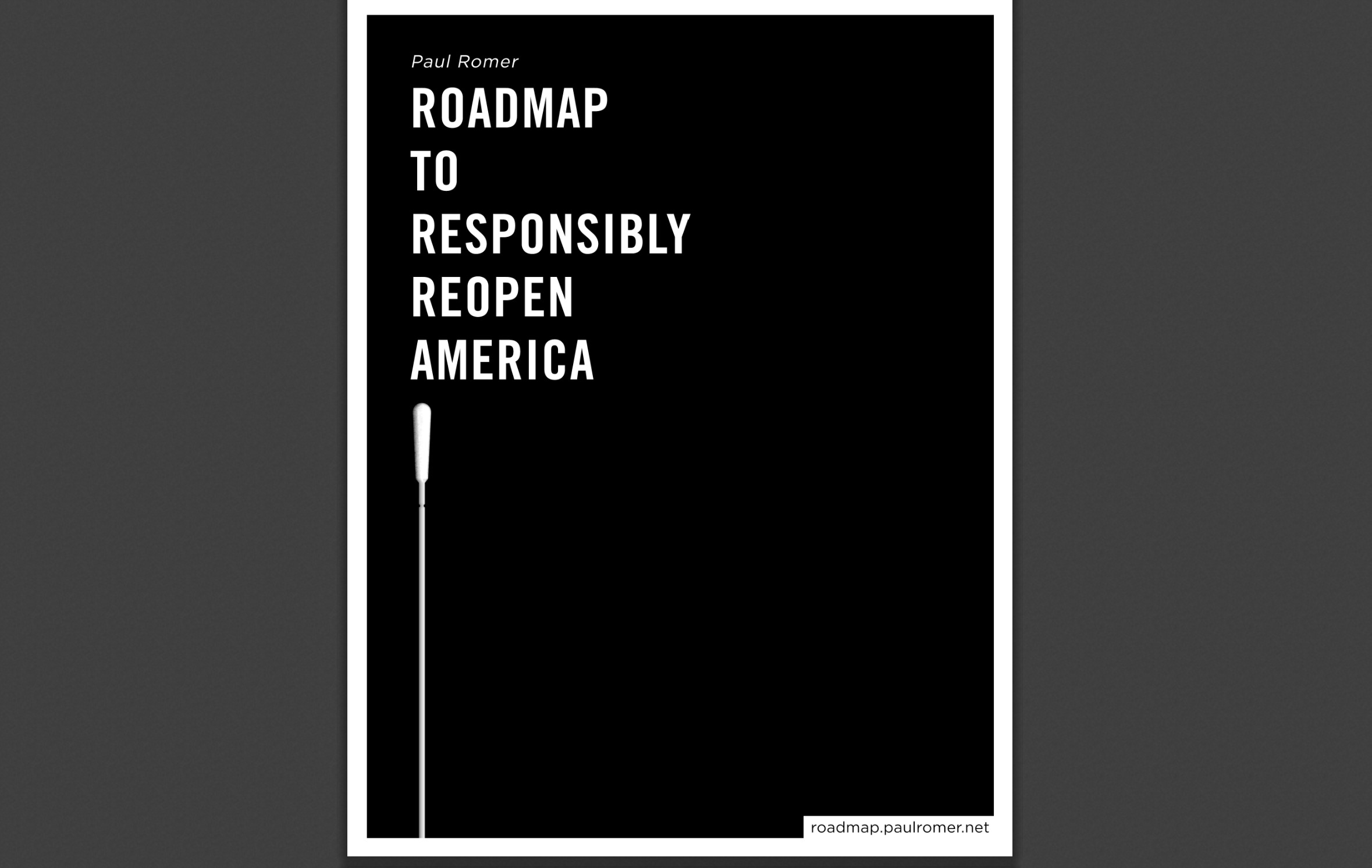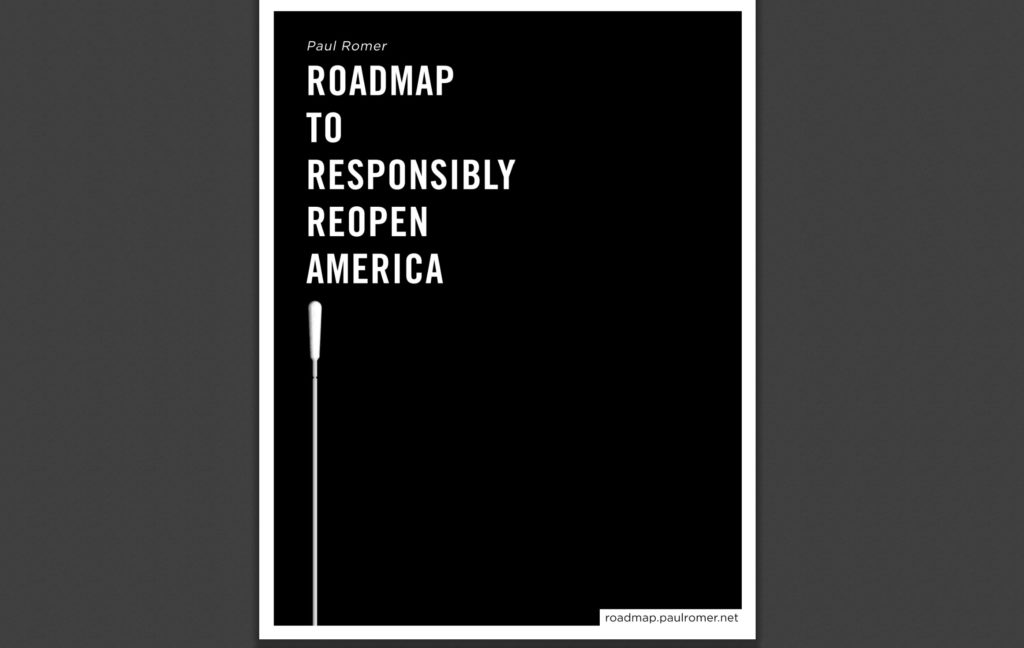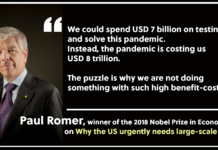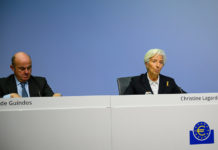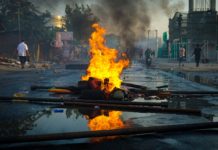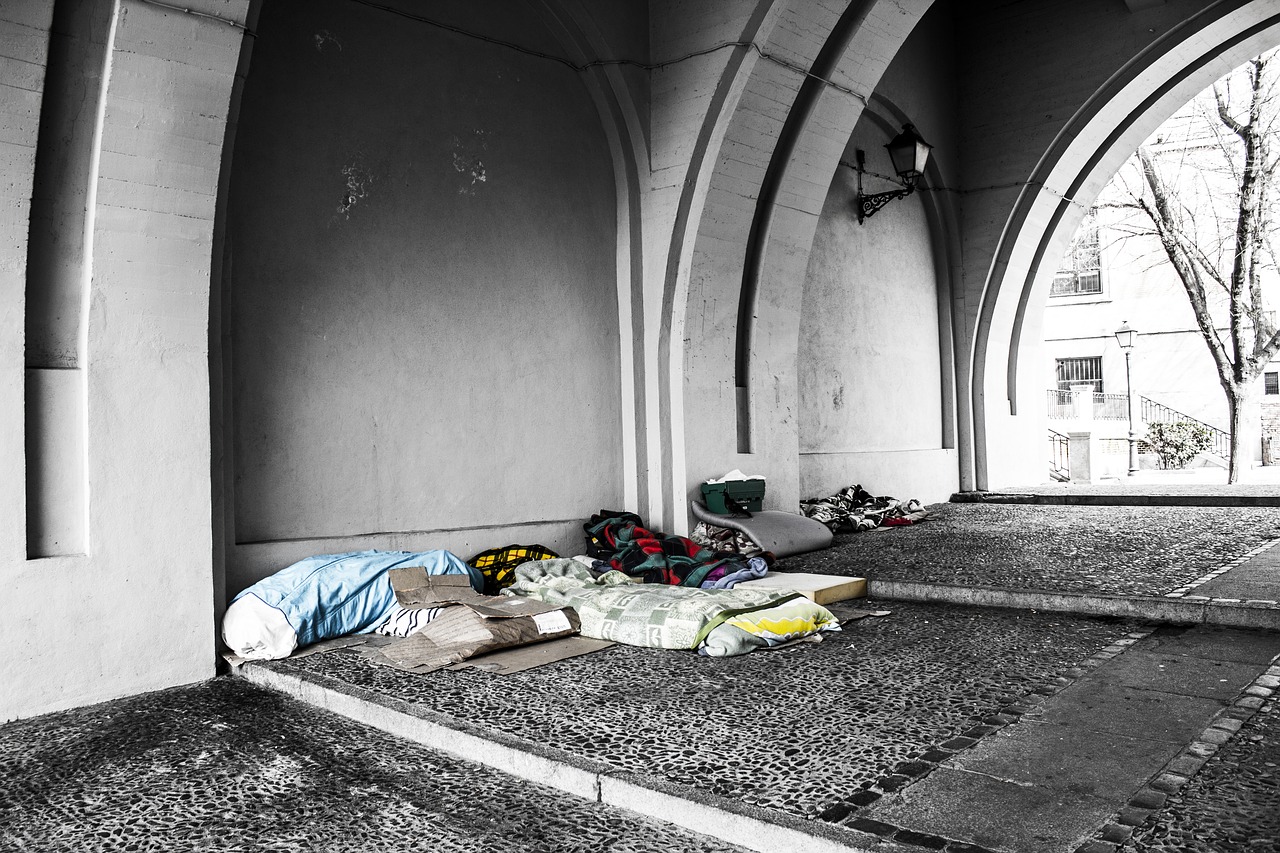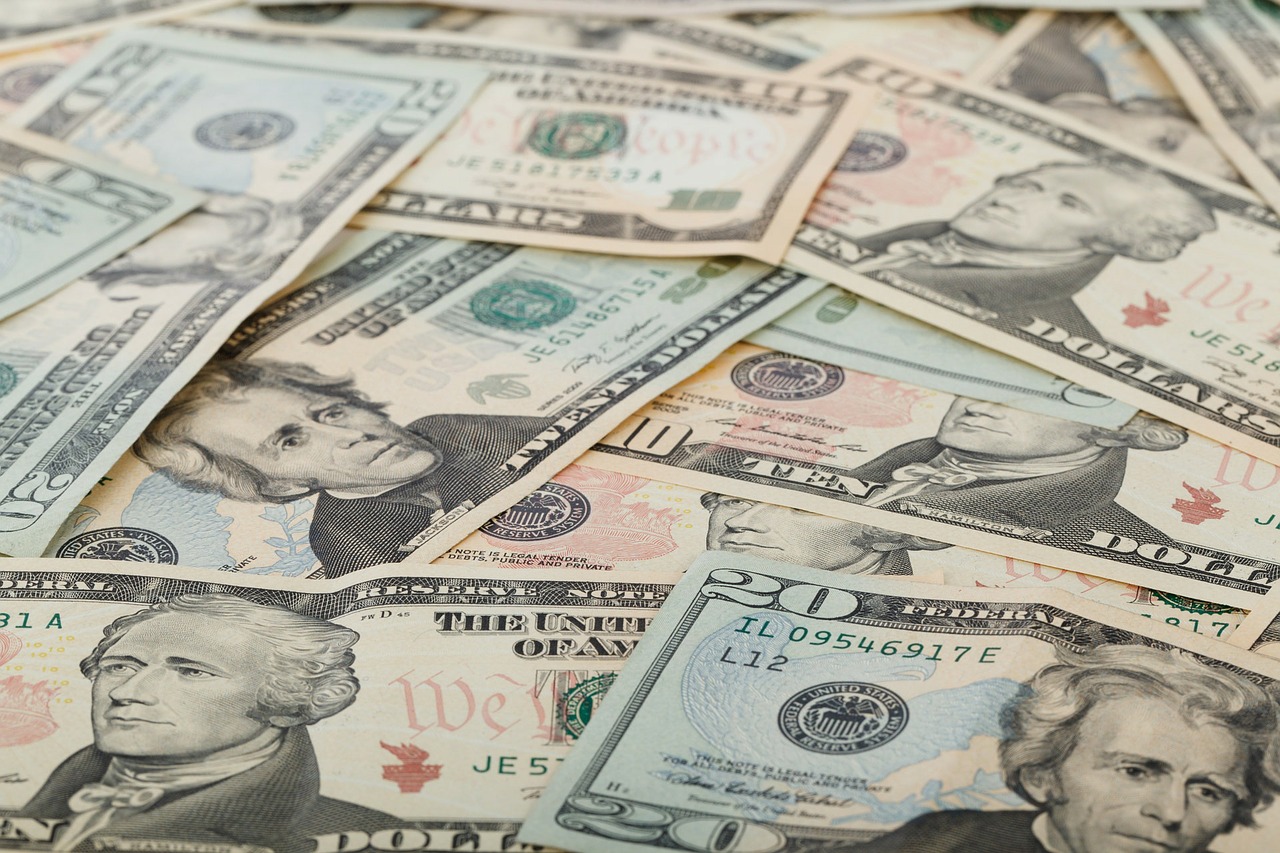Last Updated:
This is the edited transcript of our interview with Paul Romer, on why the US needs to scale up testing for Covid-19, why he thinks the covid-crisis amounts an intellectual failure, why this economic crisis is not as bad the Great Depression, what economics can do more, and what economists can learn from the crisis.
A summary of the interview can be found here
Q: EconReporter P: Paul Romer
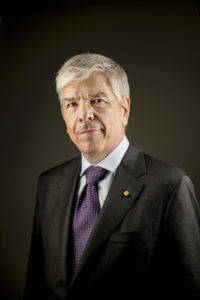 Q: US economy is reopening right now, how do you access the situation?
Q: US economy is reopening right now, how do you access the situation?
P: Even before the recent upturn, it is estimated that about 100,000 people get infected each day. At best it will continue at that level, and there are signs that it’s going to increase. So, the US has not brought this pandemic under control. In that sense, we are in a different position than most other countries that seem to have done much better jobs.
If we look at the economic consequences of that, what you see are that people are nervous about going back to many types of activities — jobs or some patterns they followed at the beginning of the pandemic — because they don’t want to take the chance to be one of those 100,000 that get infected each day.
What we are facing is months of high level of infections and the economy is in a depressed state because people are afraid of returning to their normal activities.
Q: Do you still believe that your testing plan can improve the economic efficacy of the reopening?
P: I am confident that it can. But before I was also confident that we’d eventually scale up testing and adopt that plan. So, I am a little less confident that we will do anything right now.
It’s very puzzling and troubling that the US seems to be having trouble making any decisions.
Yes, we could solve this pandemic and make it go away if we test people and isolate them. Yet, if we continue the path we are on, nothing will change.
Q: Do you still think the target should be 2.5 million tests per day?
P: No, I think we need much more than that. Let’s step back and explain why.
The pandemic is costing the US economy about USD 8 trillion right now. There are more than 1.5 million people who are infected right now, infecting 100,000 each day. If we know who those infected people are, we can isolate them and stop new infections, and the pandemic will ease. It is as simple as that.
How do you find people who are infected? In Wuhan, the Chinese government spent about USD 13 per person they tested. Suppose it costs USD 20 to test each person in the US, to test 330 million people that costs about USD 7 billion. So, we could spend USD 7 billion on testing and solve this pandemic. Instead, the pandemic is costing us USD 8 trillion. It’s just crazy we are not spending the money to test and stop the losses.
For sure, you cannot literally test everybody in a single day. In Wuhan, though, they showed that you can scale up testing quite rapidly. They tested around 10 million people in 14 days. We could launch a similar initiative in the US if we decided to do it. The puzzle is why we are not doing something that has such a high benefit-cost ratio.
I think this is partly a political failure — we don’t have good leadership right now. It’s partly a social failure — we don’t have the consensus that people have to follow rules sometimes, even it’s inconvenient for them but good for the nation.
It’s also an intellectual failure. The public health community doesn’t understand what has happened and why their usual methods are failing. Instead of stepping back, using logic and evidence to come up with a new plan, they just keep scolding everybody. It’s like when a foreigner is talking to someone who doesn’t understand their language, they keep speaking louder. The public health people are just saying the same thing over and over, louder and louder, with condescension and moralistic judgment. That’s just not working. They need to look at the evidence and think hard to come up with a new approach.
Q: This is a very gloomy situation that you are describing. It sounds like a total failure in the US, with the government, the people and even the intellectual are not doing a good job.
P: I agree. A good analogy of this I think is the French military at the outbreak of World War II. They had an extensive defense system that they thought would protect them. There were warnings as they saw the German invasion of Poland. It was clear it was a very different kind of warfare, but the French army couldn’t adapt. They didn’t change, they were stuck in its ways, and the army just collapsed when Germany attacked. In the lead-up to the invasion everybody in France had this level of arrogancy and certainty that they were much stronger.
I think in the same way, that in the US, there were many people who thought that we are the best-prepared nation in the world in dealing with pandemic. It’s okay to be wrong. Things change, and you can be wrong. What’s inexcusable is that you don’t recognize that you are wrong. What happened in France and in the US where people just stick to what they thought before, and in denial about the failure of their approach, which they thought was so wonderful.
Q: Do you think the US is on the edge of another Great Depression?
P: I thought this crisis would be worse than the Great Depression and we were going to reach 30% unemployment rate. Now, if measured correctly, unemployment is about 20%. In that sense, the economic crisis has not turned out to be as bad as I thought. I have to admit that.
A 20% unemployment rate is still the worst in my lifetime. It is the worst unemployment level since the Great Depression, but not as bad as during the Great Depression.
There is also a difference in the sense that the Fed is propping up the financial system, so we haven’t seen a prolonged collapse stock market, or bank failures or bank runs. So, we got this very high level of unemployment but without a financial crisis. It also means that the economic crisis is not as bad as I feared it would be.
It’s still pretty bad. I think it’s inexcusable for us to just tolerate the crisis at this level and have no real plan of dealing with it. But I am glad it is not as bad as the Great Depression.
Q: Macroeconomics seems to have helped the Fed to withstand a financial crisis. On other large-scale resources allocation problems, like pandemic response or PPE productions, economics seems to be less helpful. Do you agree with this observation?
P: I think we should frame it more broadly. The intellectual community that is providing advice about macro[economic] policy is doing a good job. The intellectual community that is providing advice on how to end the pandemic is doing a terrible job.
Those intellectual communities should be able to draw on the whole range of talents that we have in our universities. I don’t think it is a question of saying economists are good or epidemiologists are bad. I just think intellectual as a group has done well in helping us avoid some of the mistakes we suffered from during the Great Depression, but we’ve failed to come to grasps with what would be the effective policy for dealing with the pandemic. As I said, it’s one thing to fail, but it’s another to be in denial and refuse to admit that you are failing.
Once they get out of denial, failure can prompt people to take a look around and see what they didn’t understand and failed to see. That’s the first step.
We need credible voices from the scientific and intellectual community to offer practical suggestions about what the nation can do.
One of the things you have to do when you are offering advice is you have to take something as given, that there is something you can’t change. For example, we have a very high level of suspicion for tech firms in the US. This means that trying to use some kinds of digital contact tracing system is not going to work.
In another country, the reaction might be different, but in the US it’s a waste of time to be promoting digital contact tracing if you know it can’t succeed. You could try to understand why it can’t succeed now, or even try and think about how to change that. But that might take decades.
Practical policy advice must take account of the constraints. Something that would work in other countries may not work in the US. The relevant question is what will work in the US.
It’s a sign of denial and failure when scientists say, “Policy X works in another county, and I think the US is just bad as it doesn’t adopt Policy X.” That’s just shifting blame and the scientist isn’t doing the job, which is to come up with suggestions like, “here is something that would be politically acceptable, and that we could implement to solve the problem.”
Q: What is hindering your testing plan to become a reality then?
P: The public health community in the US strongly opposed large scale testing. The same in Britain too, by the way. So, the Anglo-American intellectual community in public health is strongly opposed to testing. Unfortunately, experts still carry some weights. They have been able to undermine the progress that legislators are willing to make toward large scale testing.
Q: In the light of the recent experiences in both the Covid-crisis and the ongoing social unrest, do you think that macroeconomics, or economics as a whole, put too much emphasis on the economy, rather than the people inside it?
P: Let me try and say it in a way that is more helpful. Macroeconomists, or economists more generally, try to help people. They understand that this is about helping people, but their notion of what would be helpful for a person is very narrow, focusing on things like income, material consumption. They don’t think about a broader set of issues.
Frankly, they haven’t paid very much attention to inequality in the past; not as much as they should have. People care about how much inequality there is in the society they live in. People also care about notions of being right and wrong, they have feelings about what is morally right or wrong.
Economists have paid far too little attention to the questions about values, like trust or commitment to integrity, like how much value we should put on the acceptance of diversity, or the feeling of true inclusion, where a large group of people think of themselves as an “us” and try to help other people in this group of “us”. Many successful nations managed to sustain a notion that the citizens are all in this together. They share a common faith and they support each other.
Economists have not thought about these kinds of issues. They talked about material gains and emphasize the value of selfishness; the notion that people being selfish will, by the invisible hand, lead to good outcomes in terms of material gain. I think that model of what leads to a good society is too narrow. This is where the critical voices of economics play a helpful role.
Q: Do you agree that there is an argument for putting “human beings”, in which embedded the values you mentioned, in economics analysis? We have methods like homogeneous representative agents or concepts like human capital. Do you think it is practical for economists to incorporate “human beings” as an analytical unit in economics modeling?
P: Sure, it is totally possible, and we should do that.
But there are two issues here, one is what kind of abstractions do you think about. Do you think about values as something like “norms”, if you want to call them that, which changes over time? I think economists should investigate that.
A separate question is how much value you get out of putting “norms” into a mathematical model. I think some; it is actually a good thing to do, and it’s feasible.
But you have to keep in mind that ultimately what matters are the facts, not the models. One of the failures in economics, especially macroeconomics, has been that economists put models above the facts, and they ignore facts. Let’s not repeat that mistake when we start to consider “norms”. Use the model but pay more attention to facts.
Q: Is economics useful in the current crisis?
P: Right now, frankly, I am impressed with the degree to which economists are doing a better job of trying to understand the pandemic than many people in public health.
It’s all relative. I think economists could do better. But the advantage they have right now, compared to the epidemiologist, is that they don’t have any commitment to ideas from the past. They are willing to look with fresh eyes at the circumstances we are facing.
Q: In summary, what do you think economists can learn from this crisis?
P: I think everybody can learn from I think what is emerging as the intellectual failure of the public health community. We will learn what we should have done differently to make sure that we don’t repeat that failure.
There are some general lessons — it is good to separate the role of the finder of facts from the writer of the rules. You need to use facts to write the rules and regulations, and it would be good to separate those two roles institutionally.
In the aviation sector in the US, for example, we have the Federal Aviation Administration that writes the rules, and the National Transportation Safety Board, which is independent, to establish the facts after each crash.
In the same way, I think we should have that same kind of separation in the area like public health.
EconReporter is an independent journalism project dedicated to providing top-notch coverage on all things economics.
💡 Follow us on Bluesky and Substack for our latest updates.💡


